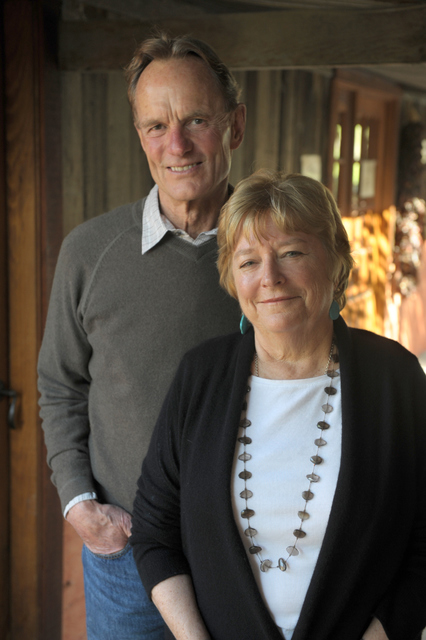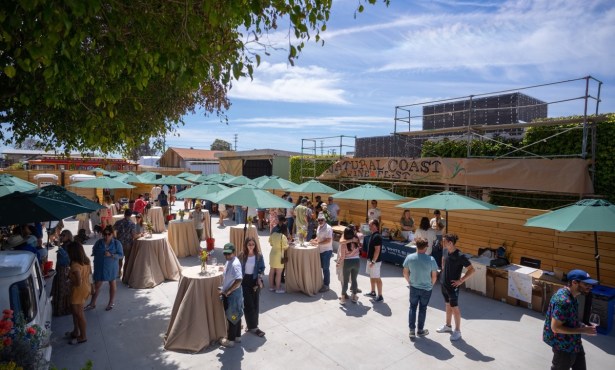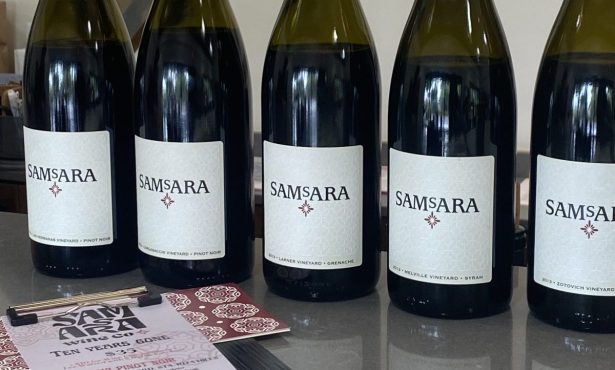Richard Sanford Ditches Debt
Legendary Vintner Partners with Investor to Emerge from Bankruptcy and Save Alma Rosa Winery
Though the poster child of pinot noir in Santa Barbara County — where he realized in 1970 that the finicky-but-beloved grape variety could thrive in the Sta. Rita Hills between Buellton and Lompoc — pioneering vintner Richard Sanford has spent much of his 40-plus year career trudging through the darker side of the wine industry, a risky world where even legends find it tough to turn a steady profit. In July 2012, he and his wife, Thekla, tried to shine the last available light into that darkness by filing for bankruptcy to save themselves and their Alma Rosa Winery. This week, thanks to Bob Zorich, a 64-year-old, Houston-based investor who graduated from UCSB in 1971 and owns a home in Santa Barbara, Alma Rosa will emerge from backruptcy with the backing to flourish into the future, Richard will again focus on grape-growing and winemaking, and, for the first time in their adult lives, the Sanfords will be debt-free.

“It’s a huge relief and a great opportunity,” said Sanford, who is 73 years old, during an interview at The Santa Barbara Independent’s office on Monday. “The exciting thing about this is that I get to return to what brought me to this business in the first place: a connection with agriculture and being in nature. I have been doing more of the business part, and that’s not as interesting to me.”
The deal for the vineyard, ranch, inventory, and brand, which was approved by a judge on January 10 and will be recorded this Friday, January 17, is worth about $2.5 million — enough, said Sanford, to ensure his debtors were “fully compensated” — but that number does not reflect earlier vineyards and assets sold by the Sanfords over past years to service debts. Though now an employee (and tenant on his former ranch) and no longer Alma Rosa’s owner, Sanford will remain the face of the brand and the winemaker in charge, with plans to plant more grapes at the seven-acre El Jabali Vineyard along Santa Rosa Road.
“What really clicked for us is his commitment to excellence,” said Zorich, whose landscape designer connected the two men when Zorich wanted to plant grapevines around his Santa Barbara home. “I really don’t want to do anything that’s not gonna be very, very, very good. I’m fortunate enough to be in a position where we can afford to do what we need to do to be the best we can be.”
Though it’s notoriously difficult to turn a profit in winemaking, the Sanfords have endured a particularly steep series of struggles, most notably when, in 2005, they were bought out of Sanford Winery, which they founded in 1981, by the Chicago-based Terlato Wine Group. They then founded Alma Rosa Winery, but went deeper into debt by purchasing back their home ranch and vineyards at a time when the land values were the highest ever. Then came the recession of 2008, around the same time a national distributor defaulted on a major deal. “I just didn’t hit it well timing-wise,” admitted Sanford, who was once $17 million in debt, though with $32 million in Sanford Winery assets.
Come July 2012, the Sanfords had no option but to file for Chapter 11 bankruptcy, which allowed for a re-organization of Alma Rosa rather than the shut-down liquidation of a Chapter 7 proceeding. Cue the “parade of characters” that offered to “help” the Sanfords and the skyrocketing lawyer fees required to process it all, and there didn’t seem to be much light at the end of the tunnel. Then came the chance conversation between Zorich and Sanford about growing grapes on the Riviera.
“In the first 10 minutes, he dissuaded me from planting vines in Santa Barbara proper for a couple good reasons, so I said, ‘If I won’t have my own vines, why don’t we talk about your vines?’” recalled Zorich, who had heard about Sanford’s bankruptcy. “Eventually, we ended up getting together and came up with a plan to make it all work.”
This is a personal investment for Zorich, but as founder of Encap Investments, a private equity firm that bets billions on oil and gas projects, he’s confident it will pay off. “Everyone has warned me that I should prepare to lose quite a bit of money, yet based on what I’ve seen and the people involved in this particular situation, I feel pretty good,” said Zorich. At Encap, he explained, “We back management teams that have a lot of experience in their business. We agree on certain strategies together and then they go execute those strategies. That’s exactly what’s gonna happen here.”
Yet he’s most interested in letting a legend shine again. “At this point in his career, Richard ought to do what he likes doing,” said Zorich. “That’s what I hope happens, and that we fill in around those skills with professionals that will understand how to do the other things well.”
The Sanfords hope the same. “This is really coming full-circle,” said Richard, “and I can go back to winemaking in our fashion.”



